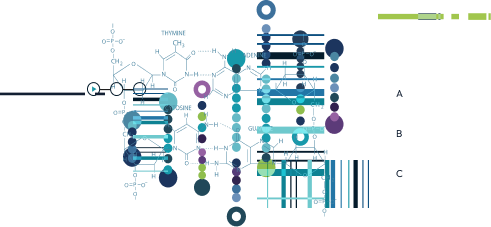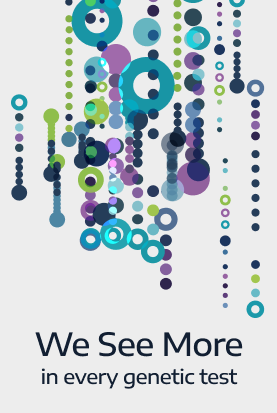We See More in Ataxia

All ataxia genetic tests are not equal. With our whole genome platform we see more. More variants, with greater resolution, all with one sample.
A genetic diagnosis can be life changing
An accurate genetic diagnosis enables the best possible medical management. Testing may:
- Inform prognosis
- Identify disorders with specific targeted treatments
- Identify treatments to stop or avoid
- Identify eligible clinical trials
- Inform family planning
- Connect families with support networks
Whole genome testing reveals more in every test
Comprehensive detection of all major clinically relevant variant types requires the right technology. Which is why we use PCR-free whole genome sequencing (WGS) which generates uniform coverage of >98% of the patient’s DNA. Compare that to PCR-based panel and exome technologies that remove and skew data, generating fragmented coverage of only 1-2% of the patient’s DNA. Pairing WGS with our Genomic Intelligence® proprietary analytical software provides the most comprehensive variant detection available.

Different testing needs for different hereditary ataxias
Hereditary ataxias generally fall into one of two categories: nucleotide repeat expansion disorders and other common hereditary ataxia disorders. Each has its own unique testing requirements.
Nucleotide repeat expansion disorders
Nucleotide repeat expansions are the most common cause of hereditary ataxias, including many of the spinocerebellar ataxias1. Within a gene, a sequence of nucleotides – often CAG – is repeated in an expanded stretch.

Common panel and exome tests are unable to detect these expansions.
Other common hereditary ataxia disorders
Sequence variants, including small sequence changes as well as larger structural changes such as copy number variants (CNVs), cause less common hereditary ataxia disorders1.

Specialized assays designed to detect repeat expansions may not include testing for sequence variants or may be limited by the range of detection.
Variantyx takes a unique approach to genetic testing for ataxia
Our ataxia tests
Variants detected by our targeted Genomic Unity® Comprehensive Ataxia Analysis include:
Variants detected by our targeted Genomic Unity® Ataxia Repeat Expansion Analysis include:
Our comprehensive analyses extend detection to >20 additional repeat expansion genes, mitochondrial sequence variants (with heteroplasmy) and mitochondrial deletions. View our complete ataxia test portfolio.
Genomic Unity® 2.0, which combines short and long-read sequencing, adds testing for BEAN1 repeat expansions which have been associated with spinocerebellar ataxia 31 (SCA31).
More variants are revealed with greater resolution
Our whole genome platform has a detection range from 1bp to whole chromosomal events. Intronic and intergenic regions are always included. As a result, our testing identifies more repeat expansions than any other provider as well as small sequence variants and copy number variants. The result is the most comprehensive testing possible, providing diagnoses for even the most elusive cases. Explore representative examples.
Learn more about our testing options
Learn more about
References
Ready to learn more?
Connect with a Clinical Specialist to find out how easy it is to bring the power of whole genome sequencing into your practice.


